- Home
- Anne Lamott
Almost Everything Page 2
Almost Everything Read online
Page 2
We picked her.
As a result, our holiday meals were definitely less wild and erudite and amusing, but we had Janet’s life and company. It was still fun, although less exhilarating and edgy. We changed.
We can change. People say we can’t, but we do when the stakes or the pain is high enough. And when we do, life can change. It offers more of itself when we agree to give up our busyness.
It was great to be with Janet and my wild-horse family, gentled. Then she lost her other son, at the age of twenty-four, in a freak accident in Sweden. He was Cliff Burton, bass guitarist for Metallica. He was Janet and Ray’s older son, Millard’s nephew.
The bottom dropped out again. We all thought we knew the truth: that no one can survive the loss of two children without bitterness and rage, especially not someone fighting for her life with peace and happy thoughts.
Yet Janet lived five more years. She was coached, and she coached others, to do radical, active self-love, and to live in the light, not the dark of the sad past. She very much felt the love and support of her two sons nearby, not as ghosts or angels, but as living presences inside her. As a conscious act she did not dwell in their deaths. She looked forward to being with them again. She courted joy and gratitude, and meditated, which seemed to work, or at least help, and then at the end, took Laetrile, which didn’t. But she lived, fully, beautifully, with sorrow and joy. She went line dancing with Ray a month before she died.
So the light did win this one. I believe that this family got its miracle, so much love and joy marbled into the cold and impossible.
Light not only warms, of course, but illuminates both things we want to see and don’t want to see. Like the North African light, our inner incandescence reveals the hallucinatory and the ordinary, the magic and the grim. Light is energy you can’t touch or corral, which is also the nature of spirit. They are both slippery, and slide around in every direction, and they are not always warm and fuzzy, which is so awful. I have felt ectoplasmic flickers of my father and best friends, life forces that have been snuffed out in the human realm but exist, like candles in another room. I once laughed in Safeway at something my friend Pammy said to me right that minute in the spaghetti sauce aisle, a year after she’d died. Light is drawn to light, like heliotropic flowers, poppies, marigolds—paperwhites. And us. Light, candles, full moons magnify spirit that is in the wings. That is a neat trick, to magnify the invisible, and it raises the question: Is there another room, stage left, one we cannot see? Doesn’t something happening in the wings argue a wider net of reality? If there are wings off to the side or behind us, where stuff is unfolding, then reality is more than we can see and measure. It means there are concentric circles rippling out beyond the life we see being acted out on the stage.
I believe there is another room, and I have experienced this reality beyond our agreed-upon sense of actuality. But that’s just me, with perhaps an overeager spiritual imagination and a history of drugs. I don’t actually know that a deeper reality exists, but I believe that it does, and at least I know to pay attention to the light.
I’m pretty sure of several other things, beliefs that may be true. So, Dearest: Here is almost everything I know.
ONE
Puzzles
All truth is paradox. Everything true in the world has innate contradictions. “I know one thing, that I know nothing,” Socrates said.
This is distressing to those of us who would prefer a more orderly and predictable system, where you could say and prove that certain things are true, and that their opposites are false. Is this so much to ask? Paradox doesn’t always work for me (okay, never), even though I believe both that we are doomed and that life is a magical, mystical gift. I love it here, love my life, though sometimes it has been devastating and sometimes, politically, a nightmare.
Life is taxing enough at its most predictable, but you can’t bank on anything. For example, we learned as children that light is particles, and in a predictable world we would all still agree that since light obviously is particles, like grains of sand, we could all get on with our lives and maybe get the cat a flea dip later. But then you have annoying people who say and can prove that light is also waves, like undulations of water.
The paradox is that both of these are true and they’re both true at the same time.
But if both aspects of light are true, then why have they never been observed together in the same room at the same time? (The old Batman/Bruce Wayne question.) If it were left to me, one camp would just give in and say, “Okay, light is particles,” or “Fine, have it your way, light is waves.”
Maybe life and light are both like that, two mints in one.
How is thinking about this at all helpful to my tiny princess self? It’s disorienting, like a disturbance in the inner ear. So what if the only constant is change? Why bother touching up your roots? What if Mother Teresa was right that “if you love until it hurts, there can be no more hurt, only more love”? Ix-nay on the urt-hay. I have hurt plenty; I’m good on hurt.
Almost every facet of my meager maturation and spiritual understanding has sprung from hurt, loss, and disaster. If it is true that the more you give, the richer you are, would you like my address? Is being born a death sentence—are we, as Beckett said, born astride the grave? If we are born to eternal life, did we already have the good parts that were in process before we existed, where possibly they served dessert with breakfast? These are the questions that keep me up at night.
Paradox means you have to be able to keep two wildly different ideas in your head at the same time. This is one too many for some people, including me on bad days, and sometimes our fearless leaders. I prefer bumper stickers. I really do. “If you lived in your heart, you’d be home now” is all I need as a life philosophy, as I barely avoid smashing into the host bumper it is pasted onto.
But all truth really is paradox, and this turns out to be a reason for hope. If you arrive at a place in life that is miserable, it will change, and something else about it will also be true. So paradox is an invitation to go deeper into life, to see a bigger screen, instead of the nice, safe lower left quadrant where you see work, home, and the country. Try a wider reality, through curiosity, awareness, and breath. Try actually being here. What a concept.
The medieval German mystic Meister Eckhart said that if the soul could have known God without the world, God never would have created the world. Paradox is an invitation to know the soul of your own cranky stubborn baby self, and of the sublime. One of the passengers on the famous US Airways Flight 1549 that crash-landed on the Hudson River in 2009 was asked afterward how he felt, and he said, “I was alive before, but now I’m really alive.” This is the invitation.
Jesus was a rabbi, schooled by rabbis, who thought like rabbis. Rabbis, upon being asked a question by a disciple, usually answer with a paradoxical inquiry or a story. This can be annoying and time-consuming for those of us looking for neat, simple answers. But truth is too wild and complex to be contained in one answer, so Jesus often responded with a question or a parable.
Most parables are paradoxical in that they don’t go the ways you think they will. Jesus is messing with people’s minds, paradoxically out of love, so they dig deeper into truth, where they may find themselves, and love, which is the kingdom.
Take any of Jesus’ parables. There’s the one about a vineyard owner who goes out all day and hires people, each for the standard daily wage, no matter how many hours they work. At quitting time, he gives the last ones hired the daily wage; but then he also gives the people who’ve worked the longest the same wage. Of course those who’ve worked the longest kvetch up a storm. I would have. I’d definitely be bitter. Here’s the paradox: The owner notes that each of them got what they’d been promised, i.e., enough, the standard daily wage. Why would anybody—like, say, an addict—want more than enough?
No one you know, I’m sure.
Each
of us wants so much assurance, and there really isn’t much. We religious types think God’s love, closeness, and grace are the answers to all of life’s pain and general horribleness. But then something bad happens to our children or our health. A young sober woman of my acquaintance who survived a grueling battle with oral cancer, losing part of her tongue in the process, had been in remission for a couple of years and then shared in a gathering that the cancer had returned. She would need more chemo. Everyone began the litany of stunned encouragement, of knowing someone’s aunt’s beautician who’d had the same prognosis and was still alive, but the young woman waved it all away like smoke.
“Oh, God’s got it,” she said cheerfully. I wear these words on a necklace. I believe this with all my heart, but at the same time I also believe in science and chemo.
I once saw on YouTube a home movie of a five-year-old girl sobbing beside her baby brother, who is sitting up with the slight rolling motion of an inflatable Bop clown. She alternately sobs to the camera that she doesn’t want him to get older, then stops to cuddle him, gazing at him like a suitor and voicing tenderly that she loves him so much, he is the most precious baby in the world, then sobs to the camera that she doesn’t want to die when she’s a hundred, then cuddles him and gushes that she loves his little smiles. I think this pretty much says it. We are consumed by the most intense love for one another and the joy of living, along with the grief and terror that we and our babies will know unbelievable hurt: broken bones, bad boyfriends, old age.
We live one day at a time, knowing it’s over too soon, in what feels like about eighteen years, seven months. Zzzzzzzip. Time for a nice catheter and heart pills. Every day we’re in the grip of the impossible conundrum: the truth that it’s over in a blink, and we may be near the end, and that we have to live as if it’s going to be okay, no matter what. Niels Bohr wrote, “The opposite of a true statement is a false statement, but the opposite of a profound truth can be another profound truth.”
We think we know what we know, and we love this so much, no matter what Socrates thought. We like to think we stand on the truth, that the ground beneath our feet is stable, moored, which totally works for me. But is it? In the San Francisco Bay Area? Really?
Yet the blessing of knowing that you don’t know is to get gently busted. We may not actually want to know this, but we don’t have a choice. It is the same feeling when I hit the wrong button on my phone and all the app icons wiggle and jiggle concurrently in what some of us more inept, possibly older people experience as taunting. Entering into paradox, and thus mystery, can be just as overwhelming. But this is also where new beginnings and hope emerge, side by side with the dark and scrambled.
Some characters in fiction and our families exist as levers, to turn everything upside down and thereby knock out of the park some of our old presumptions, pretensions, convictions, and illusions of safety. These people, both in fiction and at the holiday table, tend to be annoying and on the margins. No one is touching their hems. Just the opposite, in fact. We laugh at them, roll our eyes inwardly, and try to figure out a way not to have to sit next to them.
Someone with whom I was in love felt it made sense to criticize my son to me, to Armed Tense Mother Bear, over the phone, unsolicited and in great detail, out of the blue, and express judgment about his character and parenting. My reaction was instant, weaponized love for my son—and so I withheld from this person my affection and the invitation to my heart, let alone my bed. Forget letting go and letting God. It was time for brooding, stewing, victimized self-righteousness, and thoughts of revenge. Now you’re talking.
I told him coldly, “You’ve hurt me, and our whole family, by having these bad secret judgments all along. You’ve sullied us, and our home.”
First he tried to explain that I was misinterpreting his attack on my son, as he really wanted to help him become a better father. This is a wonderful and honest man, but I didn’t buy it, and I said so.
He asked what I thought he should do. I said, with decades of therapy and church behind me, that there was nothing he could do. Ever.
He went off to think this over. The next day, he asked me again.
I said, “You need to make this right.” And he agreed to do that.
I prayed and cried and came to sort of believe that he was perfect and also an asshat, and that I am, too. Then the next day, when he came over to talk, I was packing heat. We spoke for a few minutes, although I didn’t feel like talking, but in a crazy subconscious martial arts move, God or Holy Spirit or Coyote Trickster intervened and I found myself inviting him along to Home Depot, where I had some errands to do. Home Depot, where they fix things and make things right.
He came along, and he began to make things right by listening, finding in himself the willingness to look at his own stuff, and change, at my house, with my son.
Since then, we love and trust each other more than we already did.
When we are stuck in our convictions and personas, we enter into the disease of having good ideas and being right. My Jesuit friend Tom used to say that he never noticed what he was feeling; only that he was right. We think we have a lock on truth, with our burnished surfaces and articulation, but the bigger we pump ourselves up, the easier we are to prick with a pin. And the bigger we get, the harder it is to see the earth under our feet.
We all know the horror of having been Right with a capital R, feeling the surge of a cause, whether in politics or custody disputes. This rightness is so hot and steamy and exciting, until the inevitable rug gets pulled out from under us. Then we get to see that we almost never really know what is true, except what everybody else knows: that sometimes we’re all really lonely, and hollow, and stripped down to our most naked human selves.
It is the worst thing on earth, this truth about how little truth we know. I hate and resent it. And yet it is where new life rises from.
New life is uncomfortable, nubbly. We like soft and warm. Baby blankets are nice. We also like to wear the fleecy cloak we’ve made for ourselves, the finery of being right.
Why would you take off the cloak voluntarily? It’s so comfortable and impressive, at least to you. You let it drop or life yanks it off, and when you notice it’s gone, it doesn’t feel great. You begin to feel the cold, prickly wind, and people can see your veiny ankles.
But what comes in is fresh air on our skin, which startles us awake. We’ll never again be as open and vibrational as babies, but maybe now we’ll be a little more present and aware.
The forty-three people who died in the catastrophic fires in Santa Rosa, California, in 2017 lost everything. The survivors lost almost as much: their homes, gardens, friends, property, pets. But they had one another. They had life. And they had us—shabby, busy us. The fire was a sword that cut away all the comfort and treasure in life, the illusion of the solidity of objects, which turns out not to be so solid after all.
We saw devastation, of course, but we also witnessed holiness in the burned world and what was left standing—a fireplace, a heavily laden persimmon tree, pallets of bottled water from out of state, the sky. We saw humanity.
Don’t get me wrong—it sucked. I believe I would grieve and wail forever if this happened to me. But I would be mistaken. I would come through, via friends, community, love, grace, relief efforts. We are flattened, we come through.
Usually this holiness takes a backseat to our toxic self-obsessed nattering monkey minds. But in the Wine Country, when so much was burned and chopped away, when people’s hearts pounded with fear, when their breath constricted with loss, there was another heart beating with them—ours. Another breath was with them, and there were hands to hold. Such beautiful comfort, the holy form, the only comfort there really is—the heart, a breath, a hand. It is not the comfort I would choose, but the survivors found themselves surrounded with solace, with food, clothing, art supplies for their kids. (And sports bras! Relief organizations asked for ne
w sports bras, instead of our armpitty discards, which many women were donating with good intentions. My son bought $200 worth of sports bras. Try explaining that to your accountant.) The survivors were alive, and aliveness is sacred.
That is the paradox, that aliveness is chemical, electrical, and sacred. Aliveness is what we find way deep down inside, for a moment here, an interval there, those pulses that go on inside us all the time, in our homes, in our environment, and in the universe, the continuum from which we are so often isolated in our self-conscious kiosks, by habit and upbringing. The moment is truth, and so is the continuum.
Scientists say we are made of stars, and I believe them, although my upper arms look like hell. Maybe someday the stars will reabsorb me. Maybe, as fundamentalist Christians have shared with me, I will rot in hell for all eternity, which I would hate, because I am very sensitive. Besides, I have known hell, and I have also known love. Love was bigger.
What comforts us is that, after we make ourselves crazy enough, we can let go inch by inch into just being here; every so often, briefly. There is flow everywhere in nature—glaciers are just rivers that are moving really, really slowly—so how could there not be flow in each of us? Or at least in most of us? When we detach or are detached by tragedy or choice from the tendrils of identity, unexpected elements feed us. There is weird food in the flow, like the wiggly bits that birds watch for in tidal channels. Protein and greens are obvious food, but so is buoyancy, when we don’t feel as mired in the silt of despair.

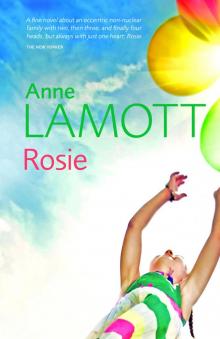 Rosie
Rosie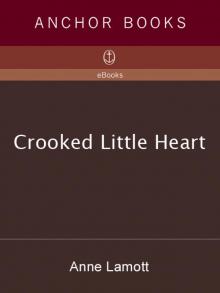 Crooked Little Heart
Crooked Little Heart Bird by Bird: Some Instructions on Writing and Life
Bird by Bird: Some Instructions on Writing and Life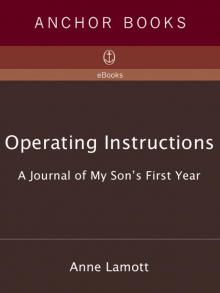 Operating Instructions: A Journal of My Son's First Year
Operating Instructions: A Journal of My Son's First Year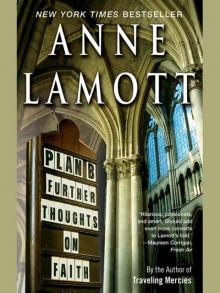 Plan B: Further Thoughts on Faith
Plan B: Further Thoughts on Faith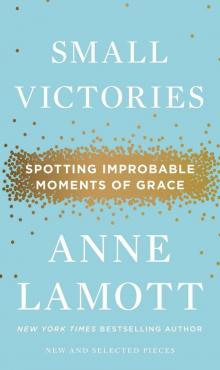 Small Victories: Spotting Improbable Moments of Grace
Small Victories: Spotting Improbable Moments of Grace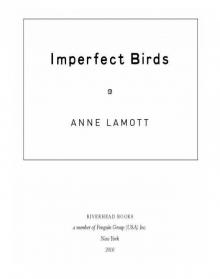 Imperfect Birds
Imperfect Birds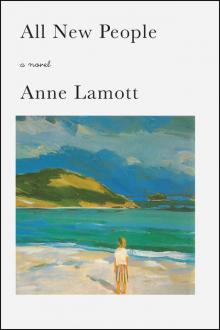 All New People
All New People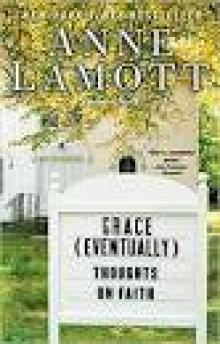 Grace (Eventually)
Grace (Eventually)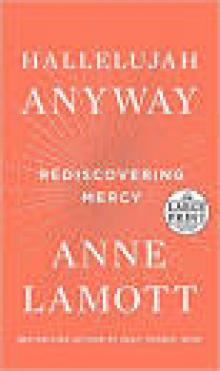 Hallelujah Anyway
Hallelujah Anyway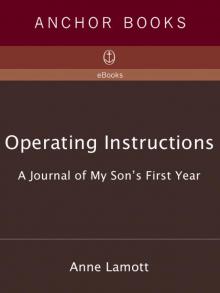 Operating Instructions
Operating Instructions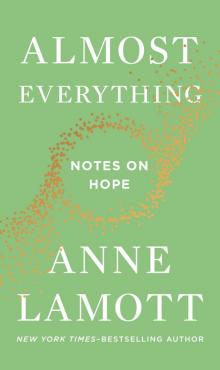 Almost Everything
Almost Everything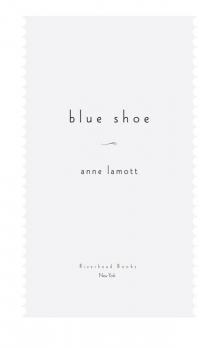 Blue Shoe
Blue Shoe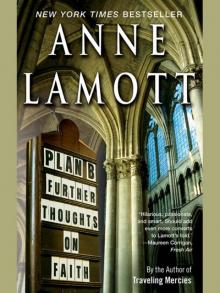 Plan B
Plan B Bird by Bird
Bird by Bird